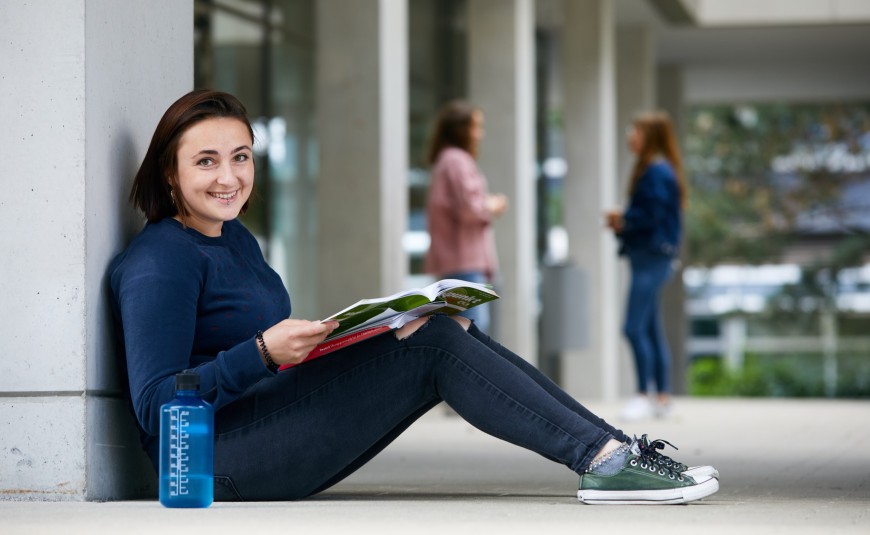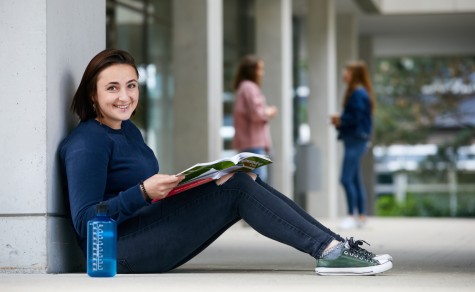Published: 23rd December 2021
Masha,
Data and Discourse Studies M.A.
I thought I wasn’t the type for studying online, because I quickly get distracted. It's different in front of a screen than face-to-face, isn't it? But it also has advantages. For example, you can rewatch recorded lectures in detail.
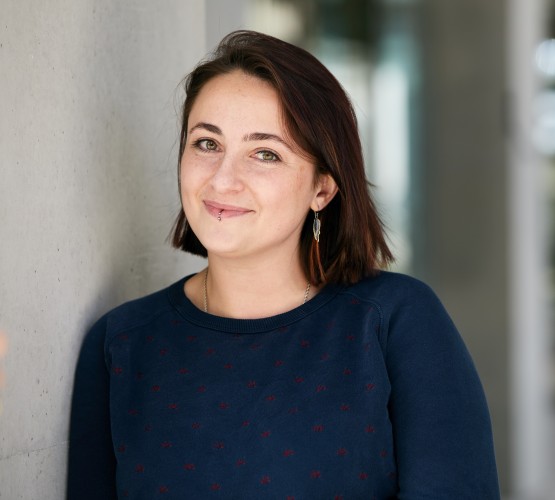
Online lectures and self-study have their advantages
In 2020, things happened pretty quickly; within a few weeks, TU Darmstadt switched to online lectures. Professor Volker Martin Betz from the Department of Mathematics recalls: “I consequently bought myself a tablet with a good pen relatively early on and thought about how I could structure my lectures.” The choice fell on a very detailed script and short videos that make it possible to follow the many contents that would actually have been written on the blackboard, such as mathematical proofs. Many other professors prepared their courses in this or a similar way. Three semesters took place almost exclusively online, and the knowledge was conveyed primarily in online meetings, videos, and scripts.
Videos and recordings of the online lectures are particularly well received by the students: “The recordings have great advantages in some lectures,” says Masha, who is studying Data and Discourse Studies in the master's programme. “It's really helpful when you can go back and review the content. Especially when the content gets very technical.”
Fortunately, the videos are still available to all students and will continue to be expanded. “I'm very happy with this format and I will keep this format up to some extent when we're allowed to go back to normal face-to-face lectures,” Professor Betz tells us. “Simply because a huge problem in math courses is that people who are inattentive for a short time often can't follow properly until the end. That's how high the information density is.”
Florian,
Biology B.Sc.
I was especially happy to meet fellow students whom I had only seen on the screen for a long time.
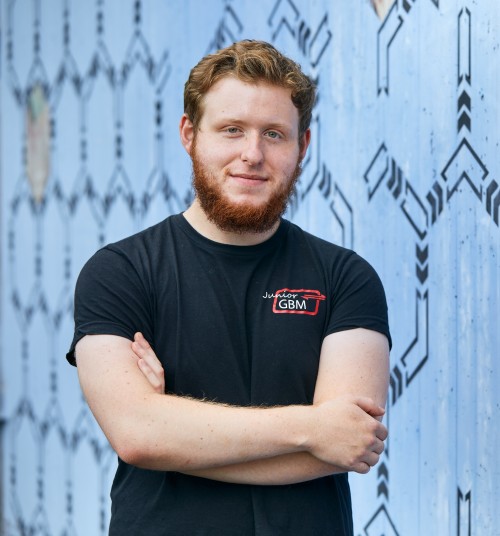
It's the mix that makes it: Where face-to-face would have been preferable!
The Central Student Advisory and Orientation Service has also focused primarily on the video format as an alternative to the open office hours on site. Student advisor Michael Kremer told us that he sees only advantages in this: “This is extremely well received because it works very simply. The office hours run through an electronic tool with an appointment booking option.” There are more channels to choose from now in student advising. Previously advice was mainly given either face-to-face on campus, phone calls, or per e-mail. “Online advising was perceived rather deficient in the past because it was mainly text-based. With video advising, you can't say that anymore, because a lot of advantages come into play, so face-to-face and online advising are now at least equal.”
Not all courses can be converted to video this easily. Practical courses such as chemistry, biology, and electrical engineering also thrive on laboratory work. Florian himself is studying biology in his bachelor's degree and has personally experienced this conversion. “I had internships that would actually have taken place in the lab, but then proceeded as follows in an online format: first we had to read a protocol, then answer questions about it, and finally write down what you would have theoretically implemented in the lab. That's when the fear arises that you'll come back to the lab at some point and know everything, but still have a hard time with the practical tasks.” This can surely be frustrating, because it's exactly the practical lab parts that make the study programme so special! Fortunately, there were also practical modules which could take place in presence as scheduled, for example in one of Florian's specialization modules.
From the lecturers' point of view, face-to-face events are also still important. “Conveying enthusiasm works better in presence. Teaching thrives on personal contact too. The casual conversations were all gone. The real and authentic doesn't tend to exist in the videos”, reports Professor Betz. This is also confirmed by Björn Egner, Dean of Studies at Faculty 2. The department offers courses in history, philosophy, political science, sociology, linguistics and literature, and theology. At the end of their studies, these can lead in very different directions: “Those who study architecture become architects. If you study engineering, you become an engineer. With us, it's different. Many who study sociology don't go on to work in jobs that are specifically advertised for sociologists”, Egner knows. That's because what you need for your career path doesn't necessarily develop in lectures, but also through encounters, consultations, chance conversations and, above all, the personal exchanges that usually take place between lectures. “My department knows what it has teaching face-to-face, and I think that's why most faculty member will go back to face-to-face teaching as well”, the dean is sure. Still, Egner doesn't rule out hybrid models and long-term restructuring in the future, either.
Professor Betz
I would advise everyone: Ask the question, even if you think everyone else knows it. Because that's almost never true. Everyone else is happy about the questions.
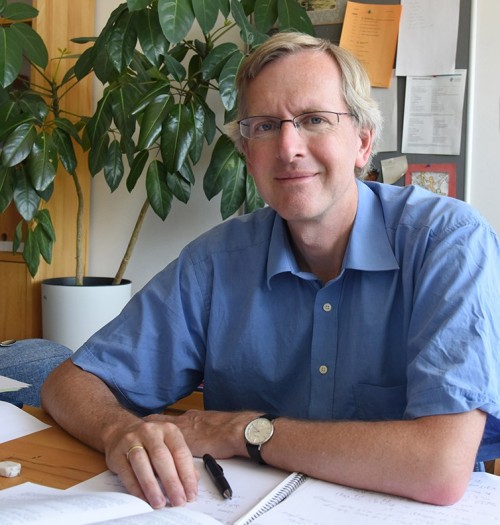
Finally back in the lecture hall: Here's how we experienced it
Let's be honest: The most challenging thing about online lectures is that you feel like you're alone with your questions! At some point, a certain monotony sets in during the daily routine and the contact via the screen is of course not the same as in real life. In our blog post on Mental Health, we took a close look at this issue. So the news that life was slowly returning to campus was also a relief for many students. “It was like coming home,” says Florian: “I was especially happy to meet fellow students whom I had only seen on the screen for a long time.”
Masha is experiencing the change to face-to-face with twice the intensity. This semester, she is studying at a partner university in the Netherlands. “I was so excited that I was half an hour early to my first lecture,” Masha recalls of the first day of her semester abroad at Radboud Universiteit. “The professor came in shortly after I did and he told me that he felt the same way.” Still, she enjoys the opportunity to listen to some lectures online: “Especially the ones that are early in the morning. I am not an early bird!”
Online lectures will be with us for a while. Some enjoy the extra time it gives them to engage with the subject matter, others really miss the face-to-face contact. In the current situation, there is always a digital alternative for every face-to-face course. So there is a suitable offer for everyone! Especially the exchange with other students in face-to-face formats can be very helpful. It is much easier to ask questions and get in touch. And if your events take place online: Dare to actively participate and ask your questions. TU Darmstadt has taken precautions to keep face-to-face and digital classes from overlapping with respect to when they are. The roomfinder of TU Darmstadt helps you to find a free room at any time so you can work or listen to lectures in peace.
Hybrid campus life? We missed the personal contact!
In addition to lectures, many other events have been moved to digital space in recent semesters. Florian, who is involved in the student council, tells us that for a long time these meetings also only took place online. In a Discord channel for the department, everyone was able to exchange ideas and get involved. Still, “it was harder to motivate people for the Fachschaft and to recruit new members”. Without the regular meetings, the relaxed atmosphere and the mate-drinking together, something was missing. But, “we've now met again in person, quite spontaneous and not for long, but it was really nice”.
For Masha, the semester abroad is going similarly: “So far, not much has happened on site for the international students. We had one event for Erasmus students and the second one was canceled because the regulations got stricter.” Opportunities for online socializing were offered, but hardly anyone was motivated. For Masha, it remains a balancing act: “I think this semester is a bit difficult in terms of social events because you're trying to find a balance between what's allowed and the experience of a real exchange semester.”
Currently, three-quarters of the usual number of TU students are once again taking advantage of the chance to spend a real semester abroad locally after three semesters of online courses. And vice versa, more international exchange students have come to TU Darmstadt again. Last winter semester, the number dropped to one-third of the usual number of students. In the current winter semester, more than half of the usual number of exchange students came to study at TU Darmstadt.
Meeting new people online and offline
Finding connections in a hybrid semester? Fortunately, there are offers from the Studierendenwerk for that! For example, we recommend the online meetings of the Studierendenwerk for international students with the Intercultural Tutor*innen Team (ITT). This makes it easier to establish contacts until more personal contact is possible again. In addition, you can also use the event calendar “DAs Bonbon” of the Studierendenwerk. The web app keeps you up to date on many cool offers and recommends face-to-face and online events by and with other students. International Student Services (ISS) always start the winter semester with the Kickoff Days and the X-Weeks for international students of TU Darmstadt. However, since many international students were still in their home countries when the semester started, these events were online. In the meantime, however, meetings also take place in person, especially when ISS guides help new students, for example, with administrative procedures. The MasterPlus OUTREACH programme took place entirely in person, as did many of the events organized by the TUtor international group, which helps international students to quickly make new friends far from home – both online and offline.
Professor Betz
The videos are a great resource, also for the future. I would like to expand and maintain this in the future.

Lots was learned and there’s more to come: This is how we would like to see the upcoming events
So, what's next? The fact that recordings are available to students for long-term learning is a very clear advantage. Professor Betz noticed a particularly large effect in a lecture he gave to biology students. There, with the same difficulty, the failure rate dropped from 25% to 10%. “You can see that people want to learn, at least enough to pass the exam. With basic lectures, it can be a huge advantage to be able to go back over the material in detail at your own pace.” His videos will therefore continue to be available.
The professors also told us about another advantage of online lectures: Suddenly there's a name under each face! For courses with over 1,000 students, that's a real luxury!
Dean of Studies Björn Egner sees further advantages, for example that substitute professors from outside, who take over lectures and seminars when there are vacancies in teaching, do not have to be “flown in” so often. “In the future, we'll just do it through Zoom.” Some students who were rather reserved when they were present really blossom in online lectures: “They usually come to the lecture and reliably write their Bs, but otherwise you didn't get that much. Then they suddenly lose their inhibitions, start talking and give presentations, and great contributions come”, Egner says.
For us, one thing is certain: It's the mix that makes the difference. Records that are available to us in the long term, fewer exams, and the opportunity for alternative forms of examination and more room for our own personal development. We hope that this will continue to be available in the future.
Health offers of TU Darmstadt
Did you know that there is a Student Health Management (SGM) of the Unisport-Zentrum (USZ) at TU Darmstadt? Here you will find offers for exercise at home or in a group. We especially recommend that you get some exercise between lectures. Online studies lack the short distances between lectures that get your circulation going and your head moving again. But there is a remedy for this:
- Study fresh up: Teachers can book trainers from the USZ to carry out short relaxation exercises with students, either in person or online.
- Take a break: This initiative promotes healthy breaks! In addition to specific offers, there are also ideas on how to take a break, e.g. lunch yoga.
Do you feel like exploring the campus now or do you feel comfortable with studying online? Write us your opinion on Instagram! We have already reported in detail about our very personal experiences in the online semester on the blog, if you want to read more about the past semester from the perspective of TU students. The TU's Higher Education Didactics Office (HDA) has also compiled resources on mental strength and emotional balance to help you deal with exam situations and anxiety and reduce feelings of stress. There you will also find various articles on study techniques in the online semester, the contents of which can of course also be applied to face-to-face courses. It's worth checking out HDA, because there's sure to be something helpful for all types of learners! We'll see you back on campus soon.
Your #studentsofTUdarmstadt

Masha
Hey! My name is Masha and I’m doing my master’s in Data and Discourse Studies. It always takes long to explain what exactly I am studying. My program is a kaleidoscope of disciplines and methods, which are weirdly and fruitfully intertwined together. For me it is a fusion of hobby and profession: languages, history, programming, philosophy! I love it how we mix approaches trying to gain this voluminous image of our world.

Florian
Gude, my name is Flo and I am studying biology for my Bachelor's degree. I was particularly impressed by the high practical component of the degree programme at the TU and on my campus. I'm with students@school so I can support students in their choice of degree programmes with my experiences and impressions of the university as a student ambassador.


